MENDOCINO CO, 78/07/17 — Two weeks ago, on July 18, dozens of people took to the podium at the Mendocino County Board of Supervisors’ meeting to air their complaints about the implementation of the cannabis cultivation ordinance. Tomorrow, Aug. 8, the Board is due to take up these complaints and try to find some kind of resolution, but with so many different issues raised by residents about the permit program, the odds that everyone will be satisfied with the changes are rather long.
At the previous meeting, Willits cannabis farmer Drew Phillips spoke to the supervisors saying, “If I can’t get through this year as a farmer, then there is no next year…I don’t want the door shut on me before I can even move through it.” Phillips’ sentiments were echoed by many others, as he requested more flexibility for farmers and an expedited permit process. But, on the other side, many residents showed up to share concerns about the impacts of cannabis farms in their neighborhoods.
The county’s cannabis cultivation ordinance was passed in April, but its implementation has been fraught, and the public and county staff have raised many issues at supervisors’ meetings. In response, on July 18, the supes directed staff to research possible modifications to the ordinance and the permitting process. It’s this that will be taken up at length tomorrow.
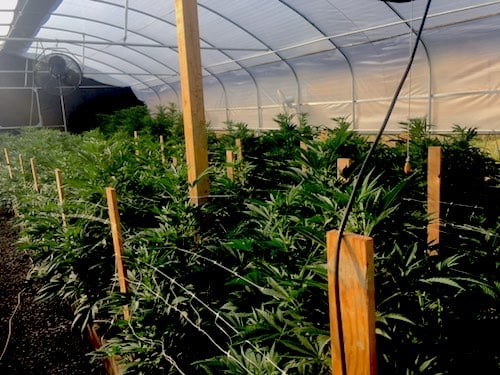
Mendocino cannabis grown in a light dep greenhouse
In July, the board decided to extend the deadline for medical cannabis cultivation permits from December 31, 2017 to June 30, 2018, and directed staff to seek flexibility on a variety of issues at the July 18 meeting. They also agreed not to allow “stacking” of gardens for medical patients on a single property. One patient is limited to 100 square feet of personal medical cultivation space under the new program, which several residents said might limit patients’ access to medicine. The supervisors also delved into a discussion of various other potential changes to the ordinance, to be taken up again by the board on August 8.
At the July 18 meeting, the supervisors also unanimously voted to create a new cannabis “program unit” and “cannabis manager position” to coordinate among county staff in departments including environmental health, air quality, agriculture, planning and building, code enforcement, the executive office, and the tax/assessor’s office. The “program unit” will be under the direction of the Board of Supervisors and report to the Executive Office.
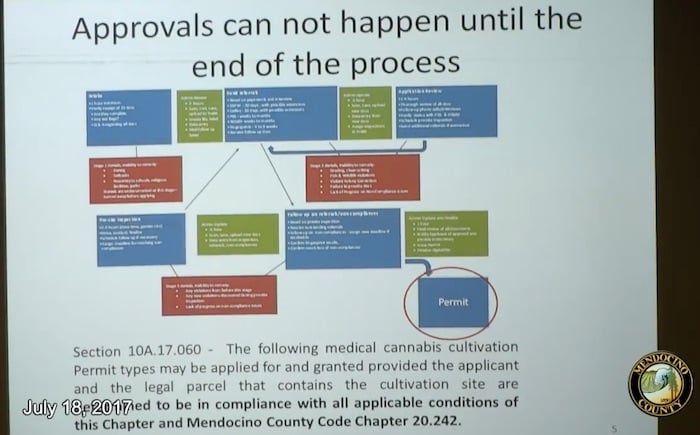
Permit approval process described by the ag department.
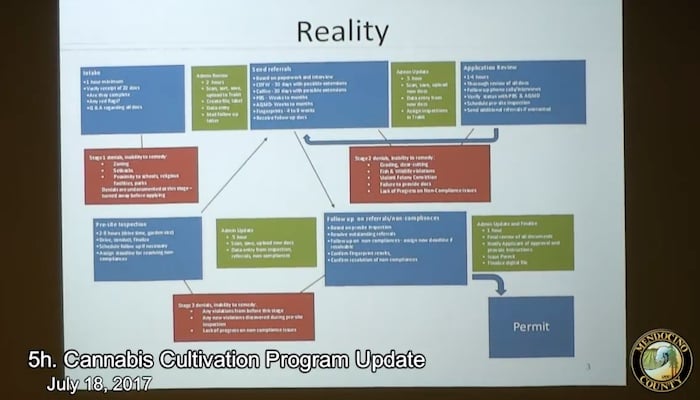
The reality of the permit process within the ag department.
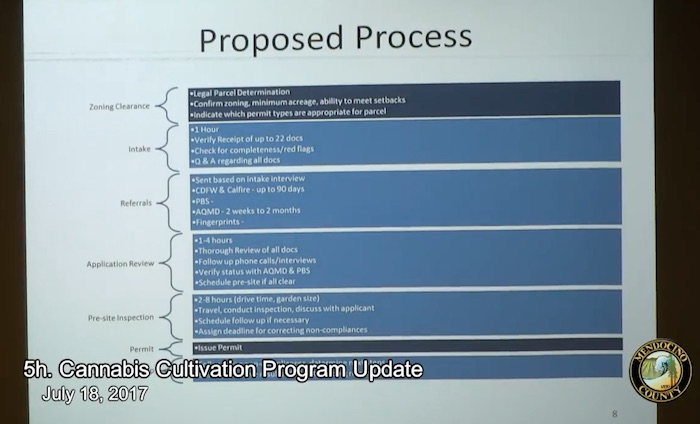
The permit process revision proposed by the ag department.
One ongoing source of confusion for inspectors and farmers “in the field” is how to handle existing unpermitted structures, such as drying sheds, hoophouses, and greenhouses, some of which may require new permits from the county, or may need to conform with standards established by the Americans with Disabilities Act (such as installing paths for wheelchair access or bathrooms). Supervisors had previously extend the amnesty deadline for requesting planning department permits until December 31, 2016. Planning department staff stated that cannabis farmers applying for county permits will have at least 60 days to submit their building plans for approval, which may be up for discussion in the proposed ordinance revisions.
However, confusion remains as to which types of structures will need what types of permits, or will need to meet ADA requirements. At the July 18 meeting, planning department staff explained their interpretation of the state requirements was that any structures used for commercial purposes must meet ADA standards. Several farmers explained that many such structures will not be accessed by employees or members of the public, and meeting these requirements add to the already high costs of coming into compliance. These farmers requested consistency with the state’s requirements for traditional agriculture operations, which are more lenient. They said they feared they would have to change their operations again, once the California Department of Food and Agriculture finalizes the statewide requirements for cannabis farms. Farmers told the supervisors that once the state licenses are in place, they may switch to drying and processing their cannabis at a centralized location, making any proposed improvements to their current structures unnecessary. The supervisors said they wanted to give farmers more time to comply with requirements, especially those that had enrolled in a previous county cannabis program, but left some of the specifics to figured out at the August 8 meeting.
Several residents who are largely opposed to the new permit program took to the podium to insist that the supervisors enforce the permit program’s requirements, as did staff from two agencies that play a role in regulating cannabis farms, the Department of Fish & Wildlife and CalFire. Residents were concerned about potential impacts to already existing businesses, such as a pumpkin patch, and asked the supervisors what increased commercial traffic might do to county roads and bridges. Angela Liebenberg from the California Department of Fish & Wildlife cautioned that cultivators might do environmental damage while expanding operations, and said that certain changes to the ordinance could require the county to go through a new California Environmental Quality Act (CEQA) process.
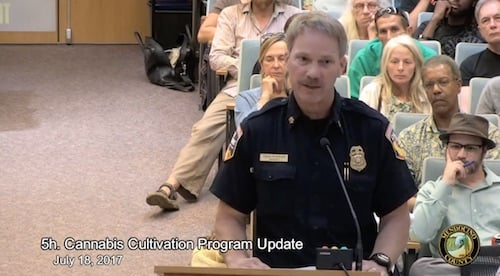
CalFire’s Craig Peterson spoke about the need to enforce the cultivation ordinance enforcement and prevent tree removal.
At the previous meeting Interim Ag Department Commissioner Diane Curry said at least 15 applicants have been denied permits while at different points in the process, some after inspections from Fish & Wildlife uncovered environmental violations, or after county staff found violations that could not be fixed. Curry said the department is not tracking all of the denials.
At the July meeting the supervisors also directed staff to extend the deadline for cannabis cultivation applications from December 31, 2016 to June 30, 2018. The state will begin issuing permits on January 1, 2018, and the state’s Bureau of Cannabis Control, Lori Ajax, recently stated that temporary licenses may need to be issued if the state’s regulations have not been finalized by then.
You can watch the entire discussion on the county’s youtube page and read the agenda documents here. The supervisors will revisit potential changes to the ordinance at the August 8, 2017 supervisors meeting — you can read the full agenda and attached documents here.

